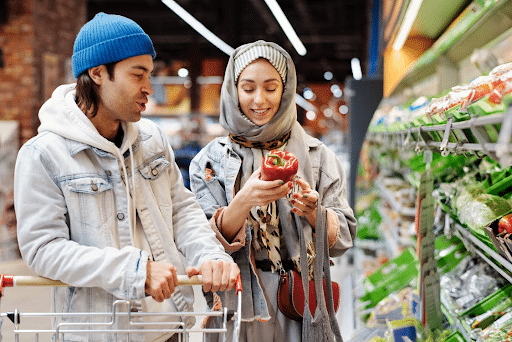Hello, and welcome back to my organic food journey! I hope you’re all doing well. Today, we’re going to talk about something very important when it comes to eating organic produce: where to buy it from!
When I first started paying attention to what I was putting in my body, I realised just how little I actually knew about food. Like most people, I’d grab whatever was on sale, probably not even look at the label, and move on with my day. But after reading up on the impact of pesticides, chemicals, and additives, I knew I had to make a change! Deciding to switch to organic food was simple, but finding quality options wasn't as easy as I thought it would be.
I soon found myself wandering through aisles of supermarkets, searching for those organic labels. But it wasn’t just about finding “organic” on the packaging; I wanted to be sure I was getting the best price without compromising on quality!
In this post, I’m sharing my experience of hunting down the best
supermarket near me for organic food. I’ll talk about the challenges I faced and how I solved these and finally found a store that checks all the boxes. If you’re thinking about making the switch to organic or just curious about where to find the best options, stick around! This is the story of how I found my go-to place for organic shopping and a few tips that might help you on your journey, too.
Why Eating Organic Is Important
But first, in case you’re new here, let me share why I feel eating organic is so important. The biggest reason is the health benefits! It’s not just about avoiding chemicals—though that’s a big part of it—but it’s also about getting more out of what we eat! Organic fruits and vegetables often have higher levels of certain nutrients compared to their conventionally grown counterparts. I figured if I was going to put in the effort to eat more veggies, I might as well make sure I’m getting the best they have to offer!
We’ve all heard about how harmful these chemicals can be, but it’s easy to brush it off when you don’t see the immediate effects. But for me, the thought of those toxins building up in my body over time was enough to make me reconsider what I was putting on my plate! Going organic seemed like a simple way to reduce my exposure to these potentially harmful substances.
Organic farming practices are better for the environment in a lot of ways! They help keep our soil healthy, reduce water pollution, and even encourage biodiversity. Knowing that the food I was eating was produced in a way that was kinder to the planet made it taste a little better, too.
I’ve always cared about where my food comes from, but learning about the way some conventional farming methods treat animals and workers was eye-opening. Organic standards often include better conditions for animals and more fairness for workers.
Okay, now you understand why it’s so important to
eat organic food, we can move on to finding good quality organic food!
Challenges Of Finding Good Organic Food

Finding genuinely good organic food was a bit more of a challenge than I expected. One of the biggest obstacles I faced was just finding a place that had a decent selection! Not every supermarket carries a wide range of organic products. Some stores only offer a small section, usually hidden somewhere between the regular produce and the speciality items, and the choices are often pretty limited. It’s frustrating when you’re trying to commit to an organic lifestyle but can’t even find basic staples like organic milk or meat at your local store!
Another thing that caught me off guard was the price. Organic food is almost always more expensive than its non-organic counterparts. At first, I thought I could just pick up a few organic items without making a big dent in my budget. But when I started adding up the cost, it became clear to me that I needed to find a solution to stop my organic eating habits from breaking the bank!
Then there’s the issue of labels. Not everything that says “natural” or “organic” is actually as pure as it sounds! I found myself spending a lot of time reading labels, trying to figure out if what I was buying was truly organic or just cleverly marketed. It’s easy to get misled by terms that seem like they’re good for you but don’t really meet the strict standards of organic certification. This added a whole new level of stress to my shopping trips, making me second-guess every choice!
Even when I did find a store with a good selection of organic products, the quality was hit or miss. Sometimes, the produce looked like it had been sitting on the shelf for too long, and other times, the organic meat options were slim and not particularly fresh. It was disappointing to pay extra for something that wasn’t even in the best condition!
All these challenges made my journey to eating organic a lot more complicated than I had anticipated. But despite these hurdles, I was determined to find a solution, and eventually, I did!
Trying Out Different Supermarkets Near Me
My solution? I would try out all the different supermarkets near me until I found the right one! My first stop was the usual chain supermarket near me. They had an organic section, but it felt like an afterthought—small, tucked away, and not very fresh. The prices were also higher than I expected for what they offered!
Next, I tried some big-name health-focused stores. They had a huge variety of organic options, but the prices were steep. It felt like I was paying extra just because of their reputation, not necessarily for better quality!
Finally, I checked out a local speciality organic store. The quality was top-notch, and they had everything you could want! The prices were not cheap, but they seemed reasonable for the quality of produce I was buying. Interesting!
Trying out different supermarkets taught me a lot about what to look for, and it helped me narrow down my choices to the places that really fit what I was after. So let me share what I think makes a good supermarket!
What Makes a Good Supermarket?
So, finally, after much research, I was able to find the best supermarket near me that sells high-quality affordable organic food. But if you don't live near me, here are my top criteria for helping you find the best supermarket for you!
1. Product Range
One of the first things I look for is the variety of organic products available. A good supermarket should offer more than just the basics. I’m talking about a wide selection of fresh produce, dairy, meats, and pantry staples. It’s a lot easier to stick to an organic diet when you can find everything you need in one place, whether that’s organic apples, free-range eggs, or gluten-free pasta.
2. Quality and Freshness
Quality is non-negotiable. When I’m shopping for organic food, I expect it to be fresh and in good condition. This means bright, crisp vegetables, fresh-smelling fruits, and meats that look like they were just cut! A good supermarket will have a high turnover, ensuring that the products on the shelves haven’t been sitting there for too long. I also look for signs that the store cares about quality, like regularly restocking or offering seasonal produce.
3. Certifications and Labels
Not all “organic” products are created equal, so I pay close attention to certifications. Look for USDA Organic or other recognised organic labels that guarantee the product meets strict standards. Some stores also offer products from local farms that may not be certified but still follow organic practices. I always make sure to read labels carefully and, when in doubt, ask the staff for more information.

4. Affordability
Let’s be honest—organic food can get expensive! As I discovered, some supermarkets charge a premium just because it’s organic, but that doesn’t mean it’s better. So compare prices and look for stores that offer fair pricing without compromising on quality! Some places offer discounts on bulk purchases or have loyalty programs that help make organic shopping more affordable.
5. Convenience
Convenience is key. I need a store that’s easy to get to, has good hours, and ideally offers online shopping or delivery options. It’s great if I can swing by after work or on the weekend without it being a huge hassle. If the store is out of the way or has limited hours, it’s harder to make it a regular part of my routine.
6. Sustainability Practices
Lastly, I consider the store’s commitment to sustainability. Do they reduce plastic use? Do they source locally? Are they transparent about where their products come from? These things matter to me because I want to support stores that align with my values, not just sell me organic food.

By focusing on these factors, I’ve been able to find a supermarket near me that not only meets my needs for organic products but also makes the shopping experience enjoyable and consistent with my values, and I hope it can help you with your organic food journey, too! See you next time!




